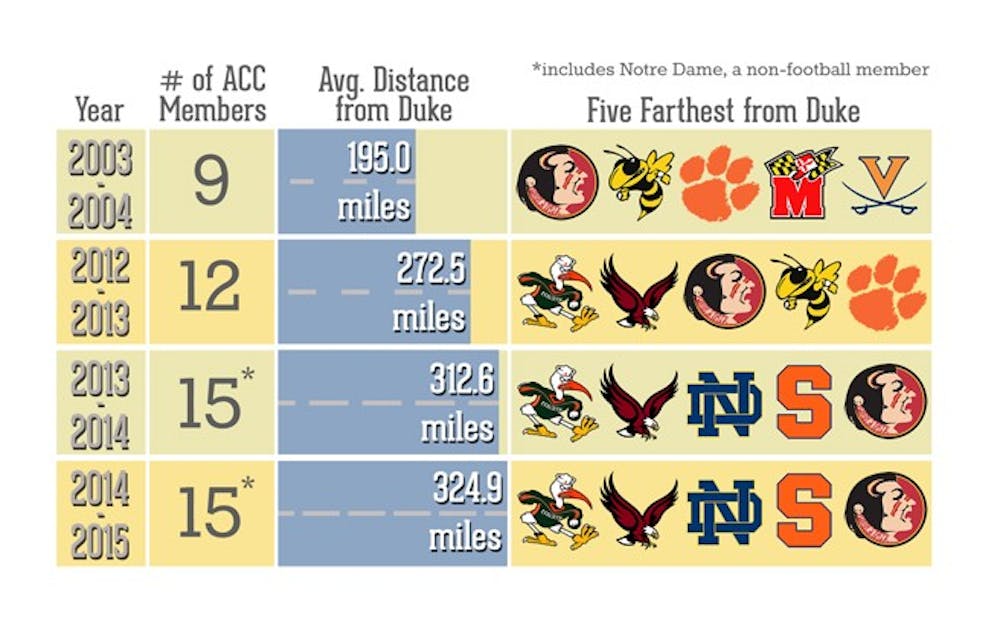Duke basketball fans are already salivating over the new additions to the ACC—former Big East stalwarts Syracuse, Pittsburgh and Notre Dame are joining the conference this season, and defending national champion Louisville arrives for the 2014-15 campaign.
Although the newcomers undoubtedly strengthen the ACC’s position as one of the premier basketball conferences in the country, it also presents some obstacles for all of Duke’s athletic programs in terms of travel. Duke University Vice President and Director of Athletics Kevin White said that the transition to conference expansion would impact teams, but he doesn’t foresee any long-lasting problems.
“I think generally speaking, with the exception of Notre Dame over in Northern Indiana and maybe Louisville in Kentucky, most of the other additions fall within the immediate footprint from Boston to Miami,” White said. “So I don’t see a real dramatic financial uptick.”
Last year, Duke’s away conference games were played an average of 272.5 miles from Durham. Wake Forest, North Carolina and N.C. State—three of the Blue Devils’ ACC foes—sit less than 100 miles from Duke’s campus. Factor in the additional trips to Syracuse, Pittsburgh, and Notre Dame, and that figure becomes 312.6 miles for this year. When Maryland departs for the Big Ten and Louisville joins the ACC for the 2014-15 academic year, the Blue Devils will travel an average of 324.9 miles each way for each road game in the ACC.
Although White does not believe the added distance will have a marked impact on Duke’s travel expenses, some coaches have expressed worries about staying within their budgets.
John Danowski, head coach of Duke’s men’s lacrosse team, said the extra milage could force some different scheduling decisions, especially for Olympic sports.
“Our budgets are limited,” Danowski said. “I think we’re going to have to either play fewer away games or drop an opponent. We’ll have to do something creative so we can stay under budget.”
Danowski’s Blue Devils, fresh off the school’s second national title against now-ACC foe Syracuse, typically schedule difficult nonconference opponents at the beginning of the season. Traveling to schools like Syracuse, Notre Dame, Denver, Penn and Jacksonville has become commonplace for Danowski’s squad at the beginning of the year.
Although Duke will still match up with Denver on the road next season, Danowski indicated that the budgetary constraints due to expanded travel for conference play—coupled with the move of two of his usual nonconference matchups, Syracuse and Notre Dame, to the ACC—might require Duke to schedule different, local opponents to fill out the nonconference slate. High Point, Richmond and Furman, all of which are fledgling Division I programs and might not look as impressive on an NCAA tournament resume, were all among the schools Danowski mentioned as possible future opponents.
Danowski lamented the trip to South Bend to face the Irish as a particularly hassling journey, one that will now become habitual for all of Duke’s athletic programs.
“It’s not easy. You have to fly to Chicago and take a two-hour bus ride from Chicago to South Bend,” Danowski said. “The night after, there’s no direct flights back from Chicago to [Raleigh-Durham International Airport], so you have to stay overnight after the game and come back the next morning as early as you can. It’s a bit convoluted, but you make the best of it, and that’s what we’ll do for all of our teams.”
Syracuse is another troublesome destination, requiring a multi-leg flight plan for most commercial airlines, the usual means of transportation for most Duke teams.
Although traveling to face the ACC’s new members does pose a challenge, Duke’s farthest treks are actually Boston College and Miami, but distance is offset by the schools’ proximities to major airports.
White said that teams may choose to forego nonconference games and play against high-quality competition in conference instead, citing the top-to-bottom strength of the new ACC additions.
“Let’s just say we play a nonconference women’s soccer game against Santa Clara, because they’re typically really good. Maybe now we just play Notre Dame, and it’s a conference game. Maybe instead of playing a sport against Stanford we’ll play it against Pittsburgh or Syracuse,” White said.
The ACC is not the only conference readying for major change. The Big East Conference of three years ago is no more—schools like Rutgers, West Virginia and the four incoming ACC schools have bolted for leagues with better football reputations, and the league’s so-called “Catholic Seven” have parted ways with the league as well and will retain the Big East name.
The former Big East, now the American Athletic Conference, has responded by adding members from across the country, including Memphis, Central Florida and Temple, and for a while was exploring the possibility of adding San Diego State, TCU, and Boise State. This year the ACC will be the only one of the six BCS conferences that can fit its members within a single time zone.
Although adjustments in travel could pose short-term restraints, White said ACC expansion will be a lucrative long-term venture. In April, the ACC passed a Grant of Rights agreement, solidifying the future of the conference. The resolution commits each university to the league through the 2026-27 season, ensuring that no other conference will tempt a school away, as the Big Ten did with Maryland. The expanded conference also allows for greater national media exposure—the ACC has a basketball deal with ESPN that is estimated to bring in $20 million annually to each school.
White said that in response to traveling farther for conference games, teams will be asked to allocate their resources differently—he views the change not as a sacrifice, but merely a fiscal restructuring.
“In practice, it will be quite manageable. You just make different decisions,” White said.
Get The Chronicle straight to your inbox
Signup for our weekly newsletter. Cancel at any time.

